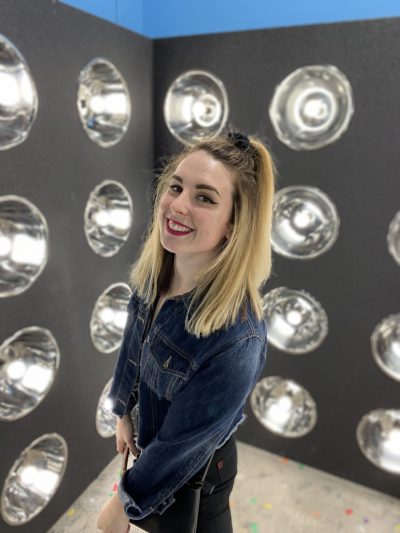A Day in the Life of a Family Clinician
 Contributions from Marlee Brown, Family Clinician
Contributions from Marlee Brown, Family Clinician
Three and a half years ago, Marlee Brown started at COMPASS as a Family Specialist for the Community Services program, working as a mentor to youth and families that were involved with the Department of Children and Families (DCF). As of May 2019, Marlee graduated with a Master’s in Social Work and has advanced to be a Family Clinician. Throughout her experiences with COMPASS, she recounts that every day is very different, “that you need to be ready for anything.” Below, Marlee describes what a “typical” day in the life of a Family Clinician looks like.
Marlee’s day typically begins around 8AM when she submits her daily check-in email, which is entered into a comprehensive daily schedule that is shared with the Community Services program staff each day. After clicking “send,” Marlee immediately caffeinates for the day with a healthy dose of two cups of coffee. Then, she checks her emails and calendar to double check her schedule and how much traffic there is, since Family Specialists and Clinicians are on the road often going from visit to visit with clients. Once her schedule and route are as solidified as possible, she heads out the door for her first visit of the day.
Marlee typically structures her day so that she has at least one visit before noon. While Community Services staff provide as many touchpoints with youth and families as needed throughout the week, the goal is to have approximately three touchpoints with each family per week (these may not all be in-person). Recently, Marlee’s morning visits during the summer months have typically been with younger children she is mentoring. During these visits, she determines the interests and needs of the youth and provides developmentally appropriate therapeutic activities. For example, Marlee utilizes expressive art therapy with the youth, sometimes making tie-die t-shirts or painting flower pots. With the flower pots, the youth paint the pot with specific areas in their life that they would like to have growth in, and then they plant flowers and watch them (themselves and the flowers) grow.
Being on the road the majority of the week has staff develop ways to establish efficiency. Marlee utilizes the time in her car for making phone calls – safely by using hands-free mode, of course! She is able to make contact with families to check-in with them to provide support and “make sure they’re feeling and being heard.” She is also able to contact partner organizations to make referrals on behalf of clients, such as calling a local YMCA to inquire about afterschool programming for a youth client. Additionally, since Community Services staff usually work on each case with a team (two to six staff), Marlee frequently brainstorms and troubleshoots challenges with cases with her teammates in order to align their interventions.
Once Marlee arrives at her afternoon visit, she is ready to lead a family therapy session in her role as Clinician. According to Marlee, the majority of her family sessions focus on establishing and/or enhancing a family’s communication skills. She lets the family drive each session as much as possible to create buy-in and to create a dynamic that is natural to the family’s day-to-day life. This can take the form of establishing expectations and rules parent-to-parent and/or parent-to-child. Marlee picked up an effective exercise from a co-worker to facilitate this conversation: each family member draws their eyes on a piece of paper and writes a sentence about how the situation they are discussing makes them feel, and then they switch papers to have each family member see the situation through the other’s eyes/perspective. By determining where a family is at, staff are able to provide relevant discussions and exercises to encourage progress.
Finally, Marlee’s days are never crafted perfectly where she always finishes her visits with families during the typical 9-5PM workday. When she has breaks in her day, she finds time to engage in self-care activities and to write the required reports for her cases. By mixing in time for exercise and report writing, Marlee is thankful that “COMPASS is supportive of staff finding work-life balance.” This flexibility given to staff allowed Marlee to complete her master’s part-time over the course of a few years while still working full-time; she was able to schedule her touch-points with her clients around her class and internships schedules.
“COMPASS does not provide a cookie cutter service; staff are allowed to try different and/or new interventions for clients that allow youth, families, and staff the room to grow. I feel like we truly make a difference.”
I love this!